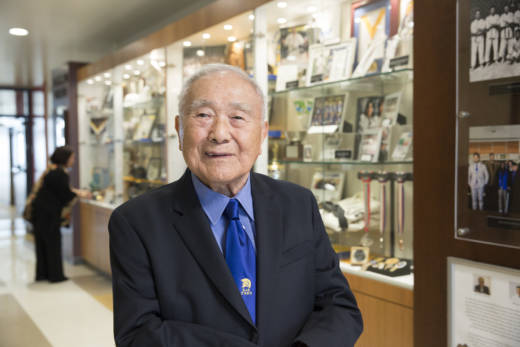“If they weren’t doing something correct, he was out there helping correct them. It was pretty amazing; he was a very remarkable guy,” Fukuda said. “There’ll be a long time before there’s another person like him, I’ll say that.”
Under the direction of the man known as Sensei Uchida, Coach Uchida, or more affectionately, “Yosh,” San José State has dominated judo since the early 1950s.
When judo made its Olympic debut at the 1964 Tokyo Summer Games, Uchida coached the inaugural U.S. team. Since then, 22 San José State Spartans from several different countries and territories have emerged as Olympians from the school’s judo program, with four collecting medals.
“I was so proud to be the first judo coach for the United States, and especially for the Japanese Americans who endured so much. I was glad they were able to see a Japanese American representing the U.S. at such a global event,” Uchida said in a 2018 interview with the California State University system.
San José State President Cynthia Teniente-Matson, in a campus-wide message that included a tribute video, called Uchida “one of the most renowned and accomplished Spartans in the history of the university.”
Uchida was born in 1920 in Calexico. He grew up in Garden Grove, and in a 2018 interview with KQED, he said his parents noticed his zeal for American culture. They introduced him to judo as a way to connect him with his heritage.
“I was not learning any Japanese culture. They said, ‘We gotta change that!’” Uchida said.
As a freshman at San José State in 1940, Uchida obliged a request to teach judo as a student coach, which he did for two years before being drafted into the Army during World War II. While he was on duty, his own family was being separated and put into incarceration camps across the American West.
After returning in 1947, he helped San José State organize and sponsor the first nationwide Amateur Athletic Union championship in 1953. Since then, San José State has won more competitions than university clubs in the rest of the country combined.
While supporting the growth of judo, Uchida also studied biology at the university, graduating in 1947. He worked as a laboratory technician at O’Connor Hospital and then at San José Hospital and eventually bought a medical lab, growing the business before selling it more than 30 years later, according to the federation.
Uchida gave back to his community, helping students when needed and he “became a driving force in investing more than $80 million into housing and commercial businesses to revitalize San José’s Japantown,” Tenitente-Matson said. He also founded the Japanese American Chamber of Silicon Valley in 1996.
He founded the San José Buddhist Judo Club because Japanese Americans were discriminated against and frequently barred from patronizing local gyms and health clubs, Dan Kikuchi, an instructor at the club, told KQED.
Kikuchi grew up with Uchida as a neighbor, later becoming his student, family friend and mentee. He worked with him as a judo teacher at the school.
“He was all about bringing rights and recognition to a generation that were interned in camps, their own sons had to serve in the U.S. military. And coming out of that, there was so much prejudice against them,” Kikuchi said.
Kikuchi recalled when he fought in the 1974 national collegiate championship judo competition. Under Uchida, the San José State team had a 12-year consecutive winning streak on the line, and they were struggling in the final rounds.
“All these coaches were yelling and jeering at him saying, ‘You’re finished, you’re done.” Kikuchi began to cry as he remembered feeling like he and his teammates had let Uchida down.
But Kikuchi said Uchida proudly ignored the other coaches while walking through the gym, and it inspired Kikuchi and two others to win their matches, catapulting the team into another title.
“He’s always kept his head up, always forged ahead and said, ‘You know, we could do this, we could do this.’”
Uchida in 2018 said he believes sports can help people grow outside the dojo as well. “As students work out and get better and better, it gives confidence to push forward,” the coach said.
Outpourings of love, admiration and respect were spreading across social media on Friday from people who knew Uchida, and who were coached by him.
“He has impacted so many aspects of not only USA Judo, but the world wide Judo,” David Williams, a former student of Uchida’s, judo coach, and San José State professor, wrote in an Instagram tribute.
“It is okay to be sad to a degree, but I would hope that we would decide it is better to applaud all the wonderful things he has done and the lives that he has influenced and mentored,” Williams wrote.
Arash Soofiani, a former student of Uchida and the owner of Westside Judo in Southern California, thanked Uchida in an Instagram post.
“What a legendary life. The Father of SJSU Judo and many legacies in the judo community and beyond. He made sure we all put our hearts into our education as well as our judo careers,” Soofiani wrote.
Though there is much sadness across the judo community because of Uchida’s death, Fukuda said he and others have great memories with the coach.
“He will be terribly missed,” Fukuda said. “He will always be remembered in a wonderful light as a pillar of strength and as a really good person who gave his all for judo because he believed in what judo could and did do for people.”
Uchida is survived by his daughters Lydia Uchida-Sakai and Aileen Uchida, grandchildren Michael and Kyle Sakai, and step-grandchildren Abigail and Jared Shapiro, the federation said.
